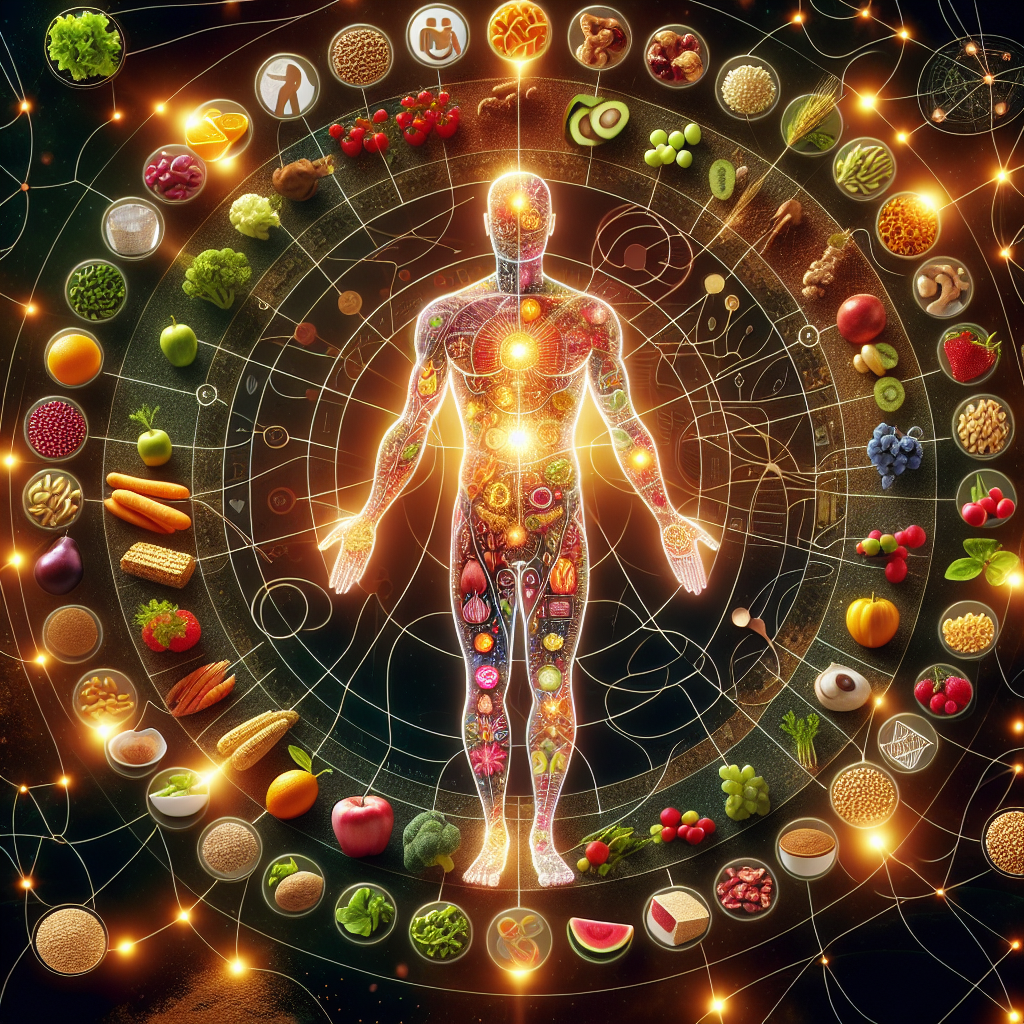Holistic Health Through Human Design and Nutrition

Discover the power of holistic health through human design and nutrition. Embrace a healthier, more vibrant lifestyle today. Visit www.myvibrantvitality.com now.
Exploring the Connection Between Human Design and Holistic Health
Holistic health is a comprehensive approach to wellness that considers the whole person — body, mind, spirit, and emotions — in the quest for optimal health and wellness. It is a lifestyle approach that goes beyond merely eliminating symptoms and seeks to help individuals achieve a higher level of wellbeing. One of the ways to achieve this is through understanding our unique human design and aligning it with proper nutrition.
Human Design is a system that combines elements of astrology, the I Ching, Kabbalah, Hindu-Brahmin chakra model, and quantum physics to provide a unique and specific ‘design’ of how an individual is energetically designed to interact with the world. It offers profound insights into our psychology, along with strategies and techniques for making decisions that align with our true nature. This, in turn, can lead to a life of more ease and fulfillment.
The connection between Human Design and holistic health lies in the understanding that each of us is unique, not just in our physical bodies but also in our energy patterns and rhythms. This uniqueness is reflected in our Human Design chart, a visual representation of the energies that are most natural to us. By understanding our design, we can make choices that align with our authentic selves, leading to better health and wellbeing.
Nutrition plays a crucial role in holistic health, and when combined with Human Design, it can provide a powerful tool for personal transformation. According to Human Design, each of us has a specific dietary regimen that is most suitable for our design. This is not a one-size-fits-all diet plan, but rather a personalized approach to nutrition that takes into account our unique energy configuration.
For instance, some people are designed to eat when they feel hungry, while others are designed to eat at specific times. Some people thrive on a vegetarian diet, while others need a certain amount of animal protein to function optimally. By understanding our unique dietary regimen, we can make food choices that support our energy and health, rather than deplete it.
Moreover, Human Design also provides insights into how we best digest life, not just food. This includes how we process emotions, thoughts, and experiences. For some, it might be through movement and activity, while for others, it might be through quiet and solitude. By understanding our unique digestion process, we can create an environment that supports our overall wellbeing.
In conclusion, the integration of Human Design and nutrition offers a holistic approach to health that honors our uniqueness and encourages us to live in alignment with our true nature. It provides a roadmap to understanding ourselves better and making choices that support our physical, emotional, mental, and spiritual health. By embracing this approach, we can move towards a state of balance and harmony, where health and wellbeing are not just goals to be achieved, but a natural state of being.
Incorporating Nutrition into Your Human Design for Optimal Wellness

Holistic health is a comprehensive approach to wellness that considers the whole person, including physical, emotional, and spiritual aspects. One of the most innovative ways to achieve holistic health is through the integration of human design and nutrition. Human design is a system that combines astrology, the I Ching, Kabbalah, Hindu-Brahmanic system, and quantum physics to provide a unique blueprint of an individual’s nature and potential. When combined with nutrition, it can offer a personalized pathway to optimal wellness.
Human design provides a detailed map of our genetic makeup, revealing our strengths, weaknesses, and potential health challenges. It helps us understand how we are designed to eat, sleep, work, love, and live. By understanding our unique design, we can make lifestyle choices that align with our natural tendencies, leading to improved health and well-being.
Nutrition, on the other hand, is a fundamental aspect of our health. It provides the building blocks for our bodies and fuels our daily activities. However, not all diets work for everyone. What nourishes one person may not have the same effect on another. This is where the integration of human design and nutrition comes into play.
Incorporating nutrition into your human design involves tailoring your diet to your unique genetic blueprint. This personalized approach to nutrition considers your individual needs, preferences, and genetic predispositions. It takes into account your body’s natural rhythms, energy levels, and digestive capabilities. For instance, some people are designed to eat small, frequent meals throughout the day, while others thrive on larger, less frequent meals. Some may benefit from a plant-based diet, while others may require more protein. By aligning your diet with your human design, you can optimize your nutrition for your specific needs.
This integration of human design and nutrition can lead to numerous health benefits. It can help improve digestion, boost energy levels, enhance mental clarity, and promote overall well-being. It can also help prevent chronic diseases and improve the management of existing health conditions. Moreover, it can lead to a deeper understanding of oneself, fostering self-acceptance and self-love.
However, incorporating nutrition into your human design is not a one-size-fits-all approach. It requires a thorough understanding of your unique design and a willingness to experiment with different dietary approaches. It may involve trial and error, and it may take time to see results. But with patience and persistence, it can lead to profound changes in your health and well-being.
In conclusion, the integration of human design and nutrition offers a holistic approach to health that considers the whole person. It provides a personalized pathway to optimal wellness, tailored to your unique genetic blueprint. By understanding your human design and aligning your diet accordingly, you can optimize your nutrition for your specific needs, leading to improved health and well-being. This innovative approach to wellness underscores the importance of individuality in health and the power of personalized nutrition. It invites us to embrace our uniqueness and to nourish ourselves in a way that aligns with our natural design.
The Role of Human Design in Shaping a Holistic Approach to Nutrition
Holistic health is a comprehensive approach to wellness that considers the whole person, including physical, emotional, and spiritual aspects. It is a lifestyle that encourages balance, self-care, and a deep understanding of one’s unique needs. One of the most intriguing aspects of holistic health is the role of human design in shaping a holistic approach to nutrition.
Human design is a system that combines elements of astrology, the I Ching, Kabbalah, Hindu-Brahmanic system, and quantum physics to provide a unique blueprint of an individual’s genetic makeup. It offers profound insights into our personality, decision-making process, strengths, and vulnerabilities. By understanding our human design, we can make more informed choices about our diet and lifestyle, leading to improved health and wellbeing.
The human design system categorizes individuals into four types: Manifestors, Generators, Projectors, and Reflectors. Each type has a unique digestive profile, which can guide us in choosing the foods that best support our health. For instance, Manifestors are often advised to eat in a calm environment to support their fast-paced energy, while Generators thrive on a varied diet to fuel their sustained vitality. Projectors, on the other hand, benefit from small, frequent meals to maintain their energy levels, and Reflectors need a highly adaptable diet to mirror their fluid energy.
Understanding our human design can also help us identify potential health challenges. For example, each type has specific areas of vulnerability, such as the heart for Manifestors, the sacral center for Generators, the throat for Projectors, and the immune system for Reflectors. By being aware of these vulnerabilities, we can take proactive steps to support these areas through nutrition and lifestyle choices.
Moreover, human design can guide us in how we eat, not just what we eat. It teaches us to listen to our body’s signals and to eat in a way that is in harmony with our natural rhythms. For example, some people are designed to eat when they are hungry, while others are designed to eat at specific times of the day. Some people thrive on eating alone, while others benefit from the social interaction of shared meals. By honoring these unique patterns, we can enhance our digestion, absorption, and overall health.
In addition to human design, a holistic approach to nutrition also considers other factors such as age, gender, activity level, and health status. It emphasizes the importance of a varied and balanced diet, rich in whole foods, and low in processed foods. It encourages mindful eating, where we savor each bite and appreciate the nourishment it provides. It also recognizes the role of hydration, sleep, stress management, and physical activity in supporting our nutritional health.
In conclusion, human design offers a powerful tool for personalizing our approach to nutrition. It helps us understand our unique needs and vulnerabilities, and guides us in making choices that support our holistic health. By combining the wisdom of human design with the principles of holistic nutrition, we can create a lifestyle that is in harmony with our true nature, leading to improved health, vitality, and wellbeing.